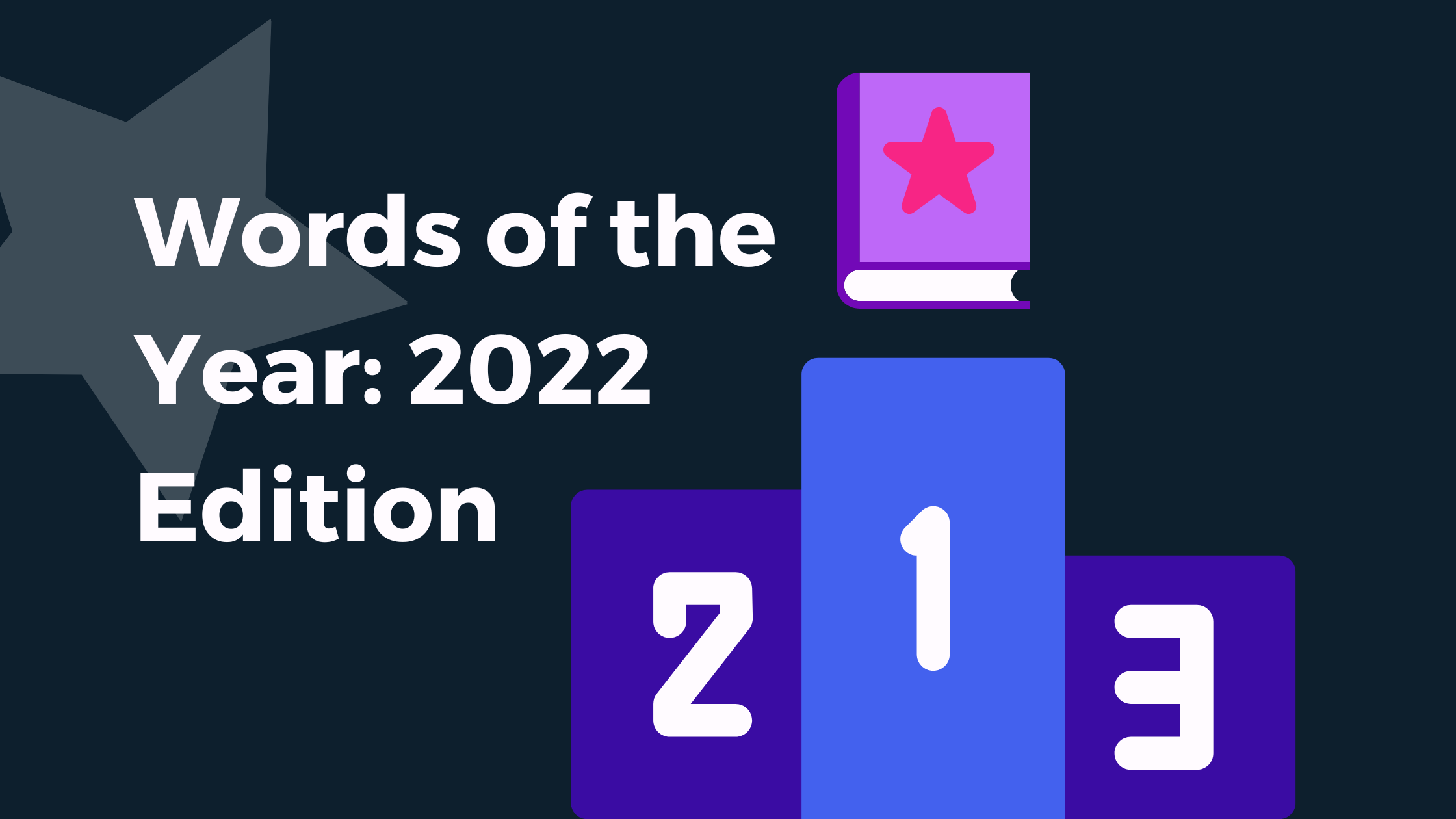Words of the Year: 2022
We've gone through the new words added to the dictionary for 2022 and 2023, but which words have defined 2022? The ones that really sum it all up?
As much as choosing a single word to encapsulate 356 days full of news, ideas, and people may seem impossible, that hasn't stopped anyone.
This is a round-up of the words of the past year, according to some of the most prominent dictionaries and linguistic organizations.
In This Article:
Where Did the Concept of “Words of the Year” Come From?
Choosing words of the year isn't a practice that sprung up from nowhere. It began in Germany in 1971 and was known as the Word des Jahres which translates, unsurprisingly, to "word of the year." The government-sponsored language society Gesellschaft für deutsche Sprache (GfdS) began the tradition in 1971. (If you’re curious, the first word they chose was aufmüpfig which means “rebellious or insubordinate”).
The United States followed when the American Dialect Society picked up the idea in 1990, and they’ve chosen a word by democratic election annually ever since. (Their first word of the year was “bushlips,” meaning “insincere political rhetoric”).
Interestingly, they have quite a few categories for words, including “Most Likely to Succeed,” “Most Outrageous,” and “Most Unnecessary.”
Since then, dictionaries and organizations have jumped on the train and designated their champion.
With that out of the way, let’s roll! (winner of “Most Inspirational” in 2001).
Cambridge Dictionary
On May 5th, an uproar was heard across the internet. The internet puzzle sensation Wordle had committed the crime of using an American English slang term. This led to shock, distress, and angry social media rants.
The word? Homer, a colloquial term for a home run in baseball.
In honor of the 65,000 searches of the word on May 5th, Cambridge has honored “homer” with the prestigious word of the year honor.
The runner-up Wordle words with the highest searches were:
Humor: anything meant to entertain or amuse
Caulk: a material used to fill gaps and seal cracks in walls, floors, and other surfaces
Tacit: knowledge that is not explicitly expressed
Bayou: a type of wetland that is typically found in the Southern United States
Collins Dictionary
Have you ever said, "It's just one of those days," for weeks, months, or even years?
You’ve experienced a permacrisis, the Collins Dictionary’s word of the year.
Collins defines permacrisis as “an extended period of instability and insecurity, esp one resulting from a series of catastrophic events.”
Collins added permacrisis to their dictionary this year, and the origins of this one are unfortunately obvious. Collins cites global political instability, the war in Ukraine, cost-of-living, and climate change as the inspiration for this downer!
Not ones to limit themselves, Collins has released 10 other words of the year:
Kyiv: the capital of Ukraine.
Partygate: the scandal surrounding social gatherings made against the recommendations of public health officials.
Splooting: the act of lying down on your stomach with arms and legs stretched out.
Warm bank: a location where people who can’t afford heating can go to get warm.
Carolean: something relating to King Charles III
Lawfare: A tactic that involves using or exploiting the law and legal processes to achieve a goal, such as attaining victory in a trial or influencing public opinion about an issue.
Quiet quitting: the act of not going above and beyond for an employer and just doing what you’re paid to do.
Sportswashing: the practice of promoting an athlete or sporting activity to divert attention from controversy, such as during the World Cup.
Vibe shift: a dramatic change in the emotional disposition of an individual or group of people.
The Global Language Monitor
The Global Language Monitor is a company that uses natural language processing to track and measure the use of words and phrases in global English-language print and electronic media.
The GLM has developed a proprietary software program that monitors the use of words in print media and social media. Fun fact: they estimate the number of new words added to the English Language at the nice round number 14.7 (though not all of these make it into a dictionary).
This year, they found that the word most used in global English was denier. The term is used to describe someone who denies or refuses to accept something that has been proven to be true. This concept is a catch-all for "hater," "cancel culture," and deniers of facts. The word's popularity stems from the rise of conspiracy theories and fake news.
Following close behind were pandemic-related words like Covid and Vax.
Macquarie Dictionary
British and Americans aren’t the only ones who get to have fun. The Macquarie Dictionary is an Australian dictionary that also documents New Zealand English.
For their word of the year, the Australian National University has chosen teal, which has a meaning beyond its humble color origins. In Australian politics, teal independents (or teals) are independent political candidates with moderate opinions in general but who support strong environmental and climate change policies.
The runner-up word was "truth-telling," which means telling the facts about a past action without embellishment.
Merriam-Webster
There have been more memes than I can count about the Merriam-Webster word of the year, so I'll keep to the facts (probably).
Gaslighting is the term for the psychological manipulation of facts that makes the victim question their sanity.
The term gaslighting is from the 1938 stage play Gas Light and its 1944 film adaptation, both written by Patrick Hamilton. In the story, a man played by Charles Boyer works to convince his wife, Ingrid Bergman, she is going insane. He does this by making small changes around their house and insisting that she cannot remember what has changed.
This includes changing the level of the gaslights and telling her it's only her imagination.
Peter Sokolowski, a Merriam-Webster editor, told the Associated Press that no incident drove its popularity, unlike many of their past words of the year. Instead, gaslighting "was a word looked up frequently every single day of the year."
Oxford Dictionary
The Oxford English Dictionary has gone democratic. For the first time, Oxford Languages has asked the public to weigh in on what they believe the words of the year are. And the public spoke!
Over 300,000 people cast a vote to decide the word of the year. And in a win for weirdos everywhere, Oxford University Press has announced that goblin mode emerged victorious.
Oxford Dictionary defines goblin mode as “a type of behaviour which is unapologetically self-indulgent, lazy, slovenly, or greedy, typically in a way that rejects social norms or expectations.” It's often used as a verb, as in “to go goblin-mode.”
While the first instance of goblin mode dates back to the far-off year of 2009, it experienced a resurgence in 2022. Mainly because the easing of Covid lockdowns meant more people were emerging from their homes blinking in the sunlight, having forgotten how exactly to interact with other people.
Coming in second place was metaverse, which refers to a collective immersive virtual space, including all virtual worlds, augmented reality, and the world wide web.
And in third place was #IStandWith, a hashtag commonly used to show support for a social/political cause or person.
Choose Your Word of the Year
A fun trend is emerging this year. Instead of picking a new year's resolution, people are choosing their own word of the year that encapsulates their goals and hopes for the coming year. So join the club, and choose your word of the year and, who knows, maybe Oxford will agree with you.
There's nothing better than starting the New Year with new content goals. Our team of content writers can get you on track for your most successful year yet. So schedule a call today to get started!
Related Articles







